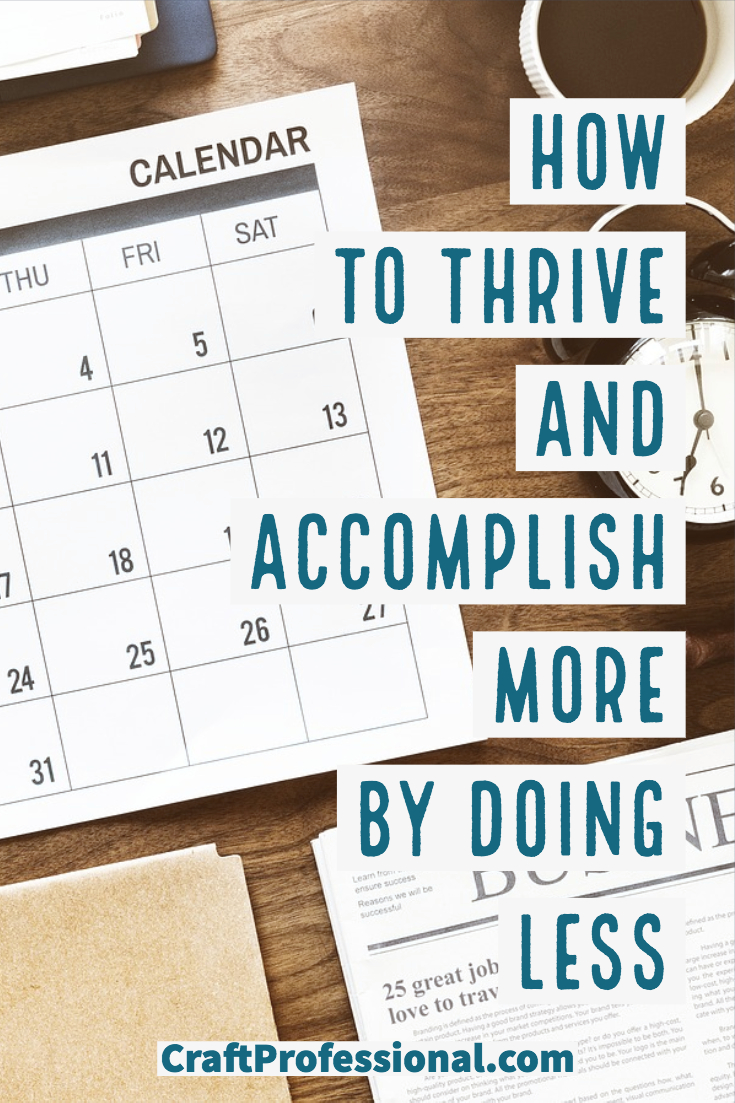Setting Priorities to Do Less Better
Have you given much thought to setting priorities for your business?
In the midst of the intensity of juggling the demands of your business and your life, have you ever stopped to consider whether everything you're juggling is truly essential and productive?
Maybe you don't need to do more. Maybe, what you really need in order to thrive is to do less.
I earn a commission for purchases made through links on this page.
To learn more, please see my disclosure.
"We don't need to be more productive; we need to do less better."
That's what Tony Crabbe, author of the thought provoking book, Busy, says. The deeper I got into his book, the more I realized that this advice is a great fit for what many craft professionals are working to accomplish.

We live in a culture that tends to compete on more - more volume, more productivity, more busyness - and assumes that more is better. But if your business is based on handmade products, for the most part, you can't compete on more because each of your products requires your individual attention.
So, learning to do less better could present some wonderful opportunities for craft business owners.
Instead of assuming more is better, what if we put more care into setting priorities, committed to doing those things exceptionally well, and accepted that to do those things well, we'd have to be willing to let go of some other things?
Setting Priorities
If you're going to chose to focus on some aspects of your business and let others go, how do you decide where to put your energy?
Two great places to start setting priorities would be to focus on things that are most in line with your values, and things you can do uniquely well.
Years ago, when I was studying to be a career advisor, I learned that the biggest cause of burnout is living or working in a way that is not in line with your values.
It's much easier to let go of day to day stresses when you fully believe in the big picture goals you are working toward.
"He who has a strong enough why can bear almost any how." Nietzsche
I also learned that one of the smartest ways to stand out from competition was to find something special about the way you work that others in the same niche cannot easily match.
You don't have to churn out more and more work or compete in a race to the bottom for the lowest price. Instead, figure out what makes you special in your type of work, and make the most of it.
Choosing your priorities based on your values will help to ensure you're building a business that you believe in and that will serve you well. And choosing your priorities based on your unique strengths will help to differentiate you from the competition and allow you to provide exceptional value to your customers.
Set Priorities Based on What You Value
I absolutely love Tony Crabbe's definition of success.
He says, "Success is the degree to which your life is lived in line with your values."
For me, that single sentence says everything.
If you're going to set boundaries and do fewer things better, they might as well be things that are in line with your values. For most people, it will take some soul searching to determine what those values are and how they might impact your choices.
To get started, here are some questions you can ask to help set boundaries, pinpoint what elements of your business are most in line with your values, and determine how you could change other aspects of your business to better reflect your values:
- What are my core two or three values?
- What do I really want from my business?
- What am I willing to let go of in favor of things that support my values?
- How could I do less to enjoy more?
Set Priorities Based on What Makes You Uniquely Valuable
Crabbe says you need to ask yourself, "What makes you uniquely useful to your business?" He's talking about being a valuable employee in this case, but the question is a smart one for business owners to answer.
What makes you uniquely valuable to your potential customers?
What skills or background do you bring to your niche that make you different and able to deliver something that is particularly prized by your customers?
You might hear this strategy referred to as audience based positioning.
It's about being deliberately different. It's not about competing on volume. You're focused on creating something better instead of just churning out more.
Here are some questions to ask to help you determine what makes you uniquely valuable to your customers:
- How can I meet my target audience's needs?
- How could I bring much more focus toward my target audience?
- What problems can I uniquely help them solve?
- How can I strengthen relationships with my customers?
- How can I make their lives easier?
- What makes me uniquely useful?
- What valuable expertise and experience do I have?
- What can I do that others can't?
- What capabilities do people most admire about me?
- How can I demonstrate my greatest strengths within my business?
- What products can I develop to make the most of my most admirable abilities?
- What should I do to focus on my core strengths?
What are you willing to give up?
If you're going to laser focus on things you most value and things you are uniquely good at, that means you'll almost certainly need to give up some things. As part of a commitment to focus on doing less better, Crabbe says we also, inevitably, need to look at what risk or loss you will have to accept.

What do you need to let go of in order to allow the things you value most to flourish?
How could you have fewer activities and interests but enjoy more by being able to focus better and on fewer?
As much as we may feel the desire to slow down, letting go of things can be tougher than you might think. Setting priorities effectively, however, means not only defining the important things you will commit to, but also determining the things you will let go.
Moving Forward
Busy
If you find the idea of doing less, but doing it better as compelling as I do, I think you'll really like Tony Crabbe's book, Busy
Most craft professionals really can't compete on more. You only have two hands, and there's only so much time in the day. You need to differentiate yourself in other ways.
I've read more than my fair share of productivity-type books. There aren't many I love, but I do truly love the book, Busy. Tony Crabbe's advice to help you do less better is both eye-opening and extremely compelling.


New! Comments
Have your say about what you just read! Leave me a comment in the box below.